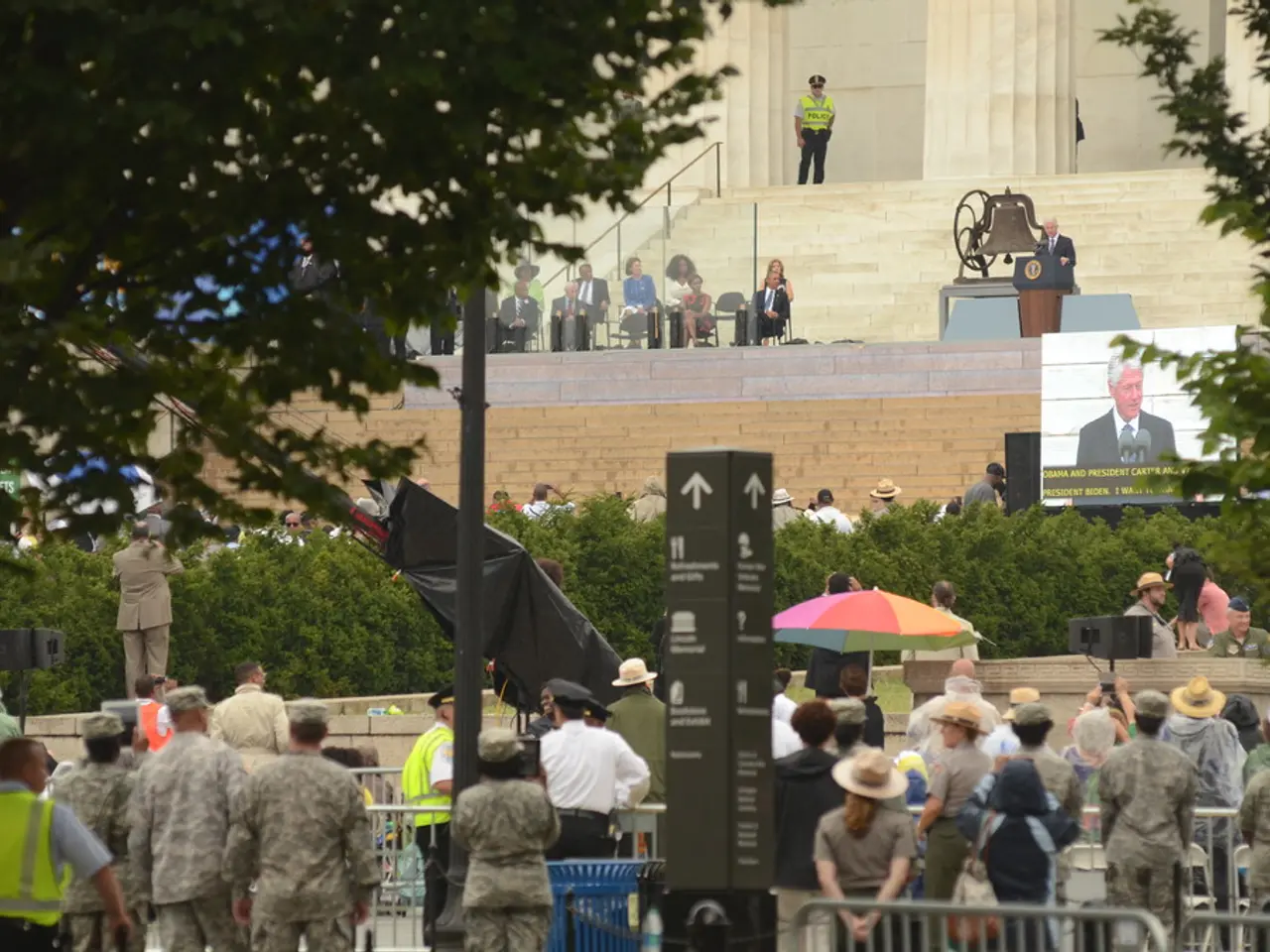Foreign leaders find Trump's revised approach to Oval Office interactions disturbing
In the realm of international relations, the diplomatic approach towards the United States under President Donald Trump has undergone a significant shift, departing from the norms of previous administrations. This transformation is reflective of Trump's distinctive "America First" and realist foreign policy agenda.
One of the key changes is the transactional and hardline nature of U.S. relations with its allies. Gone are the days of cooperative diplomacy, as Trump's interactions with U.S. allies range from indifference to hostility. This stark contrast is highlighted by the shift in Trump's approach to Russia, as he seeks friendlier ties with a historically adversarial nation.
Another significant departure is Trump's break from multilateralism. He has abandoned the rules-based liberal international order, favouring bilateral deals and national interest-driven policies over global cooperation on issues like the environment and global health.
Trump has also promoted tariffs and trade-based incentives as alternative diplomatic tools, choosing to influence foreign behaviour without resorting to direct military intervention. This represents a remodelling of U.S. diplomacy compared to the traditional reliance on military power, particularly in the Middle East.
Trump's negotiation style is characterised by his pursuit of serious concessions from foreign parties in conflicts, such as Ukraine and Russia, and his unpredictable decisions, including threats of military strikes and peace overtures.
High-profile meetings, such as those at the G7 summit, did not always occur under Trump's presidency, reflecting a more selective and strategic approach to diplomatic engagements.
Famously, the meeting between Mexican President Vicente Fox and former President George W. Bush took place at Bush's Texas ranch, a stark contrast to the public scolding, threats, and shouting matches that marked Trump's meeting with Ukraine President Volodymyr Zelensky.
Navigating the Oval Office under Trump requires a unique approach. Lithuania's former foreign minister, Gabrielius Landsbergis, advises preparing for a meeting with Trump as if it were a television show, while Rufus Gifford, former US ambassador to Denmark and chief of diplomatic protocol under former President Joe Biden, suggests making Oval Office visits a "nice meeting where you get to know each other as human beings."
Trump's handshakes can be aggressive, and foreign leaders are advised to be ready to resist. The Oval Office under Trump functions more like a royal family or a king's court, with personal access to Trump or his family being crucial for making progress on requests.
Allies and foes alike have been subjected to unprecedented tariffs and the ignominy of placating Trump for preferable trade terms. Foreign leaders have taken Trump's behaviour during Oval Office visits as a sign that they should mentally prepare for diplomatic "jiu jitsu," trolling, or even "North Korean" style adulation.
Despite the risks, small countries like Lithuania view the reward of an Oval Office visit as outweighing the risk of a Trump smackdown. Trump himself has acknowledged that he's more confident in exercising his powers in his second term and is less concerned about potential limitations or criticisms.
Sources: [1] Fareed Zakaria, "Trump's Foreign Policy: A New World Disorder," CNN, March 1, 2017. [2] David Ignatius, "Trump's Ukraine gambit: A dangerous gamble," The Washington Post, July 25, 2019. [3] Ivo Daalder and James M. Lindsay, "Trump's Foreign Policy: A New World Disorder," Council on Foreign Relations, March 1, 2017. [4] Peter Baker and Katie Rogers, "Trump's G7 Summit: A Break with Tradition," The New York Times, June 10, 2018.
- The political landscape of international relations under President Donald Trump has witnessed a dramatic change, driven by his "America First" and realist foreign policy philosophy.
- The U.S. relations with its allies under Trump have moved towards a transactional and hardline approach, replacing the collaborative diplomacy of previous administrations.
- Trump's approach to Russia signifies a shift, aiming for friendlier ties with a historically antagonistic nation.
- Multilateralism has taken a backseat under Trump, who favours bilateral deals and policies driven by national interests over global cooperation on matters like the environment and global health.
- Trump has used tariffs and trade-based incentives as alternative diplomatic tactics, refraining from direct military intervention.
- Trump's diplomatic approach is characterized by his pursuit of significant concessions from foreign parties in conflicts and unpredictable decisions, such as threats of military strikes and peace overtures.
- High-profile meetings, such as G7 summits, were not always held during Trump's tenure, reflecting a more selective and strategic approach to diplomatic engagements.
- The meeting between Mexican President Vicente Fox and former President George W. Bush stands in stark contrast to the public scolding, threats, and heated exchanges that characterized Trump's meeting with Ukraine President Volodymyr Zelensky.
- Navigating the Oval Office under Trump necessitates a unique approach, akin to preparing for a television show or making Oval Office visits a chance to connect as human beings.
- Trump's handshakes can be aggressive, and foreign leaders are advised to be ready to resist.
- The Oval Office under Trump operates more like a royal family or a monarch's court, with personal access to Trump or his family being essential for making progress on requests.
- Allies and adversaries alike have experienced unprecedented tariffs and the necessity of placating Trump for favourable trade terms.
- Foreign leaders view the risk of a Trump rebuke as outweighed by the potential rewards of an Oval Office visit.
- In his second term, Trump has expressed more confidence in wielding his powers and less concern about potential limitations or criticism, adding another layer to the complexities of international politics.





